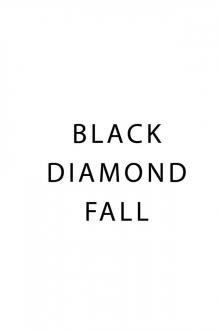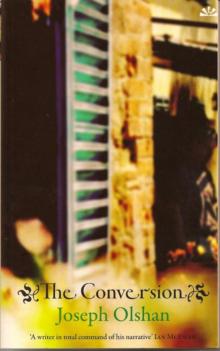- Home
- Joseph Olshan
The Conversion Page 2
The Conversion Read online
Page 2
I told him no, that I’d basically spent the last three years freelancing for Fortune 500 companies, translating business Italian into business English, and that I was currently doing a large job for IBM. However, I’d also translated the odd poem, and one novel for a small press in Louisiana.
Holding his drink up to the light, inspecting it as though it were some kind of multifaceted jewel, Ed said, “Your novella really should be translated into Italian.” He now locked eyes with me. “It’d be a delight for you. I love reading the Italian editions of my poetry.”
He sounded faintly obnoxious, but I’d soon discover that this sort of bluster was more self-protective than arrogant. Unfortunately, the thrill of meeting him had begun to evaporate. Slowly I was being engulfed by the familiar, plummeting sense of despondency over the small rations of time that I was spending with Michel Soyer; the fact was I’d become fatally hooked on a married man.
Then, as though reading my thoughts, Ed surprised me with the gentlest of gestures. Grazing my chin with two of his fingers, he said, “You have to pick yourself up, Russell.”
Thinking that he was referring to my stalled literary career, I said, “Hey, maybe I’m just not meant to be a luminary like you.”
“No, no, I mean I can tell that you’re sad … about your lover. So let me forewarn you: You probably have a lot of heartbreak ahead of you in your life.”
I was affronted. Heartbreak? From whom? Not from him. “Why do you say that?”
His arrogance was gone. “Because I believe that human nature has a tendency to choose misery over happiness. That’s why we all keep repeating the same mistakes.”
And so he had divined the nature of my attachment to the married Frenchman and perhaps even sympathized. Ed’s last comment would plague me for months.
A week after our meeting at the café, without even realizing it, I passed Ed’s apartment building on the rue Birague. I was making my monthly pilgrimage to the Museé Victor Hugo at the far corner of the place des Vosges. The museum was my own private shrine to literature. I’d wander through the scantily attended drawing rooms, eyeing the relics of the great novelist’s life, his collection of landscapes and portraits, his thousands of books. At various times during my visit I’d stop strolling, shut my eyes, and start praying for the inspiration to begin writing again.
I’d always been impressed by the fact that Hugo wrote standing up. I liked to linger at the entrance of the room where his tall, simply designed desk was on display. I’d imagine him dipping pen to inkwell and scribbling Les Misérables, which, after Balzac’s Cousin Bette, was my favorite nineteenth-century French novel. I remember that particular summer afternoon I was feeling distressed at how preoccupied I’d become with Michel. It was this discomfort that had brought me to seek solace at the museum.
From the very beginning Michel had made it quite clear that he was deeply entrenched in married life and that his sex life with men was and would always be strictly recreational. He’d even warned me that if and when his wife found out about our affair, he’d be bound to break it off without any deliberation. When somebody boldly shows their cards in this way, when everything seems so straightforward, it’s almost easier to deceive yourself. One might think, for example, “Okay, I can clearly see that this is a bad situation and I’d be a damned fool to get too caught up in it.” But then, I painfully discovered that, paradoxically, such candor on the part of your lover can also be disarming.
I mistakenly thought I’d be able to see trouble coming long before it arrived. I certainly tried to keep Michel’s unavailability in mind every time we got together. But I found that with each session of lovemaking, my resolve to protect myself unraveled just a little bit more. Eventually I fell into that unwanted state of longing for someone to whom you’re profoundly attracted but who will never be able to give you what you want. But you hang on anyway. Nothing is more painfully absurd than when lust dupes you into believing it’s destiny.
Standing before Victor Hugo’s mahogany secrétaire, I thought to myself that if I only could begin another writing project, this just might prove to be the antidote to my quixotic attraction to Michel. I reckoned that starting even a short story would give me a focus, a purpose that would have as much power to distract me as a new lover might. Then I impulsively reached beyond the silk cordon that forbade entry into the room and grabbed a leg of Victor Hugo’s desk. The wood was wonderfully smooth and cool to the touch, and I closed my eyes for a moment and prayed for inspiration, even for deliverance from my romantic obsession. The next thing I knew, a hand grabbed my shoulder. A guard in vermillion uniform had appeared out of nowhere. “Touching, that is not allowed here, sir!” he told me imperiously. “You will have to leave now.” Hand clamped to my arm, he escorted me out of the museum into the place des Vosges, where, in the gauzy, summer light, Parisians were sunning themselves in the formal gardens, eating their sensibly small tidy lunches.
In some corner of my soul I believed that my prayers to the ghost of Victor Hugo eventually would be answered; and they actually would be, but not in the way I’d wanted. That very evening Michel called me with an atypical invitation: to ride with him to Aix-en-Provence, something like a six-hour trip on the back of his motorcycle. “We’ll stay a few days,” he said in his characteristically unflappable manner. And yet his deep baritone voice always seemed to carry an undercurrent of seduction. “Then maybe go on to Nice. See how we feel,” he said. “What do you think?”
“What about Laurence?”
“She’ll be going to the house in Brittany with the children. Why do you ask?”
Why did I ask? Simply because ever since I’d known him, Michel always dutifully accompanied his wife and children to their house in Brittany. And so I boldly inquired how he’d managed to wrangle the time away from his family. There was a pause, as though Michel had not anticipated such scrutiny of his generous invitation. “I like to go on long rides. Once or twice a year I take off for five days. And this time I thought to myself: Why not have the company of a sexy American boy?”
He arrived at my place in the 18th early the next morning. He’d told me to bring only what I wore, an extra pair of dress pants, and the necessary toiletries. Although at six feet tall, two inches taller than I am (and ultimately, two inches shorter than Ed), we wore the same size button-down shirts and T-shirts.
Michel liked me to wear his clothing, mainly because it was always beautifully laundered (and mine never was), but also because it was a fetish for him. In particular he liked me to borrow his very brief French underwear; he hated what he called my “unsexy American boxer shorts.” When we lay down together, he’d pull his underwear halfway down my thighs and with an evil grin tell me how “slutty” they looked. This part went on in English; his enunciation of the two t’s in slutty was charmingly erotic.
The first morning of our excursion, when I climbed aboard the BMW, knowing that he’d carefully packed the saddlebags for two (and, I imagined, with the clothes that he wanted me to wear), I started to get hard thinking about it. We began to weave through the North African 18th arrondissement, passing street vendors hawking roasted corn, Arabs mingling in their djellabas. I tightened my knees around his legs and remarked to myself how good our bodies felt in this sort of motorcycle tandem.
Although Michel’s height and bulk made him seem more like an American, his face had a refined, carved look that could not belie his Germanic ancestry. At the same time, his almost-too-prominent features were softened by the ringlets of light brown hair that highlighted his gray eyes. Sometimes when I’d had a few drinks, or when I was annoyed with him, I found his face too sharp-featured, too angular to be called handsome, and when he made me furious I thought he looked like a rodent.
Our relationship was primarily an inspired, romanticized sex life whose reverberations were deceptively profound. A sex life characterized by a lot of sultry chatter about the sorts of things we did and what we might do in the future. Until I met Michel I never real
ized that previous erotic episodes could be talked about to heighten the mood of the present; until I met Michel I never realized that remaining partially dressed during the act could be incredibly arousing. He certainly broadened my appreciation of the male body, from the obvious pull of his form-fitting T-shirts to the suggestion of contours through well-cut business suits. On the rare occasion that we went out for dinner, he would supervise my dressing and always insisted I wear a crisp button-down shirt and a tie. There was nothing sexier than taking off another man’s tie, he used to say. It didn’t take me long to realize that the more layers Michel had to go through to get to the core experience of the unadorned body, the more turned on he became. Which was why he was a big fan of leather—arm bands and chaps—and of flimsy G-strings. He liked adding these accoutrements to the mix as much as he liked to talk about what we’d do in bed. Once I even dared to question him if he made love to his wife in a similar fashion, and he looked at me as though I were insane, as though he expected me to just assume he made love to his wife as chastely as possible. Or that he no longer made love to her at all.
It was a glorious excursion blessed by arid, cloudless weather; the wind blasting our faces on the motorways was as dry as dust. The temperature spiked during the day but always ended up in chill. It took two days to get to Aix. We arose early every morning and had enormous breakfasts of baguettes and local cheeses and huge cerulean bowls of café au lait. We avoided the superhighway and found our way along secondary roads, stopping for hour-and-a-half lunches of hard salamis and cornichons and bottles of Burgundy. We spent so much time on the motorcycle that the vibrations from having ridden that many hours stayed with me long after we dismounted.
We had sex at least twice a day—usually at the hotel. However, on one occasion we managed to do it in a secluded grove of poplar trees that Michel staked out before pulling off the main road. He’d brought a vinyl tarp that rolled up tightly and commanded very little space. Wrapped inside the tarp was a bottle of lubricant that came in the shape of a medium-sized dildo. He spread the tarp in the shade and we went at it like two beasts. I must add that during our entire time away, he was effusively affectionate and seemed incredibly content, although I did notice a few moments when he became worryingly withdrawn.
We rode back into the city in late afternoon of the fourth day—glorious Paris luxuriating in a scarf of sunny amber; so many vibrant fruits were perfectly arranged in oak bins, grand monuments casting languorous shadows, well-heeled Parisians crowding the narrow, smoky cafés and strolling the Seine arm in arm. There was a pervading smell of fermenting yeast and the slow, simmering scent of cognac sauce. Hugging Michel around his taut stomach, resting my chin on his shoulder, I found myself bitterly regretting that in a just a few moments I’d be alone. And, indeed, in a month’s time, my apartment swap would be over. I found myself wishing some other opportunity for work would present itself before I’d have to hoof it back to my cheap one-bedroom flat in Brooklyn in an out-of-the-way place called Gravesend.
As we drew within a few blocks of my apartment, the sadness of having to part with Michel overwhelmed me. After all, I’d never before had him to myself for four days straight. It was a luxury I felt I could easily get used to and even began fantasizing that Michel’s feelings for me would become so urgent and undeniable that he’d be forced to leave Laurence. I got myself worked up into such a state of absurd hope that I felt tears smarting in my eyes and had to fight off the urge to weep. For I instinctively knew I could never show this desperate side of myself, that it would portend disaster. Instead, I promised myself a swim at the fifty-meter pool at the Forum des Halles. I’d do laps, look at all the attractive Parisian men, maybe even get some attention, and somehow make myself feel better.
When we finally arrived at my building, Michel parked the motorcycle next to one of those green, octagonal newspaper kiosks. The swarthy North African man who sold roasted corn there recognized me, nodded, and smiled. But I didn’t really pay much attention to him then because I was fighting to keep my composure. I hastily grabbed my toiletry bag and my dress pants and was preparing to say good-bye when Michel hit the motorcycle’s kill switch and said to me, “Russell, I need a word.”
“About what?” Sensing something wrong, my whole lovesick body went on pulsing alert.
His gaze was steady and without expression. “Well … honestly Laurence finds out about our relationship.”
The terrifying feeling of free fall began. “She did? But did you tell her?”
“Of course I don’t tell her!”
“Then how?”
He heaved a great sigh in the way the French do and exhaled through tightened lips. I was so light-headed and frantic that the subsequent words came to me piecemeal, as though we were in a wind tunnel. Apparently, the previous week while he and I were having coffee in out-of-the-way Saint Germain-en-Laye, a friend of his wife also happened to be there, unbeknownst to Michel. We’d been seen holding hands and nuzzling each other.
I heard him saying quite distinctly, “And so when Laurence asks me, I don’t deny it.” Not quite comfortable with English, Michel had an annoying tendency to cling to the present and future tense, whose narrow dimensions somehow made his news sound even more harrowing and irreversible.
“Well, you said you would never deny it,” I replied automatically in a breathless voice.
He merely shrugged. “She has told me to stop it. And as you know, and as we discuss, I must do as she asks.”
“But … the last four days?” I sputtered. “What have they been about? Why did you go away with me when you knew this was going to happen?”
Michel said, “Well, she knows I will be with you. I tell her I want to be. And she let me go, but only if I will speak to you at the end.”
“So you’ve known about it the whole time?”
He nodded.
“That’s … really lousy.” I began to stutter. “You at least could have told me first!”
Michel’s expression was at once compassionate and, I couldn’t help noticing, slightly impatient. Later on, after replaying the scene thousands of times, I began wondering if that moment of slight irritation was actually the sign that, although my sexual power seemed to equal his, he was actually realizing that I was still a lot younger and greener than he was, in short a liability. An enormous leaf came feathering down from a tree and brushed his face and he closed his eyes self-protectively. At that moment he looked so vulnerable. Had I wanted to, I could’ve easily punched him and knocked him to the ground. When he spoke again, it was with more patience. “Would you really want to know, Russell?”
Of course. Why wouldn’t I?
He shook his head resolutely. “If you know, I doubt you will have gone with me. And if you know and still decide to go with me, you would never enjoy yourself.” He smiled forlornly. “At least we can say that we have these four wonderful days. Not true?”
Now I think to myself: Who else but a Frenchman would be able to pull off a breakup with such disarming diplomacy? But of course, at the time I still felt monstrously mistreated.
“Well then, if I have no say in this, then what can I say?”
“Nothing but good-bye, Russell,” he replied with great courtesy, offering me a handshake instead of a kiss. Quite a contrast to perhaps six hours earlier when he was begging me for sex.
I was so furious with Michel at that moment I couldn’t speak. Although the compulsion to attack him and hurt him openly grew stronger by the second, it ended up scaring me into a state of inertia. All I could do was watch him lope over to his BMW and mount it. With a flick of his wrist, the motor ignited and his motorcycle launched down my street, its chrome tailpipe transmitting a sad flash of acknowledgment in the dusk of a late-summer city.
Watching him ride out of my life was so incredibly painful. There was no delayed reaction, no numbness or shock. The tearing sensation that is so clichéd was stunning. And somehow in the midst of it, I happened to notice an elderly woman, in
a kimono, her thick mascaraed eyes staring down at me from her apartment window, a cigarette between her fingers. She observed the obvious signs of a chagrin d’amour with what I imagined to be the recognition of someone who’d perhaps lived through it many times herself. She reminded me of a wise old Colette peering down into the street like a patron saint.
I sank into a fuguelike depression, the sort in which your appetite dries up and there is a perpetual coppery taste in your mouth. I slept very badly, my dreams frenzied and feverish and always of operatic length. I’d wake up in the middle of some outlandish scenario in which Michel was playing most of the parts—male and female—and marvel at the insane dimensions of my imagination and then, like a psychic prisoner, tumble back into the same nightmare.
I will say, however, that Paris comforted me: the precise contours of its formal gardens à la française; the rapturous, musky scent of its towering linden trees; winding streets bulging with shops whose eclectic displays inspired fabrics with brilliant color and texture; fresh flowers that seemed to have been cut only moments before in some vast, sun-dappled field. All of it brought brief moments of solace.
One week into this terrible interlude, Ed called me out of the blue. He sounded genuinely surprised to learn of my chagrin d’amour and immediately invited me to dinner. By our third engagement he’d already begun lobbying for me to stay on in Paris—with him at his apartment on the rue Birague. Until he’d mentioned the tantalizing idea I’d been consoling myself with the thought of getting far away from Michel and France, of returning to America. And now I can admit to myself that I let Ed convince me to stay on because I still held out some stupid glimmer of hope: Michel would miss our relationship so much that, despite his promise to his wife, he’d come back to me.
Three
In an hour we shall cross into Italy. And I believe that will make you feel better,” says Marina Vezzoli, the Italian writer Ed and I met in the café. A day after his death, she’d contacted me, extended her condolences, and offered to let me stay in her family’s villa in Tuscany while I sorted things out.

 Black Diamond Fall
Black Diamond Fall Cloudland
Cloudland Nightswimmer
Nightswimmer The Conversion
The Conversion